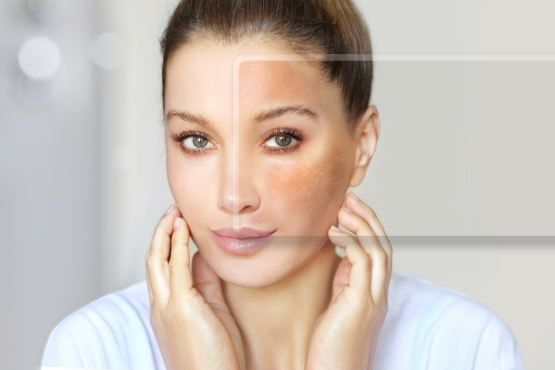Skin inflammation can occur for a variety of reasons, and it's important to understand what causes it and how to reduce it. In this article, we'll take a look at the different variants of skin inflammation, their causes, and some smart tips to reduce it.
Types of Skin Inflammation:
Contact dermatitis: This type of skin inflammation occurs when the skin comes into contact with an irritant or allergen. Common irritants include detergents, soaps, and cosmetics, while allergens can include anything from certain plants to certain metals.
Atopic dermatitis: Also known as eczema, this type of skin inflammation is a chronic condition that often runs in families. It can cause red, itchy, and scaly patches on the skin, and it's often triggered by stress, certain foods, and changes in temperature or humidity.
Psoriasis: This autoimmune condition causes skin cells to grow too quickly, resulting in scaly patches on the skin that can be red and itchy. It's often triggered by stress, certain medications, and infections.
Rosacea: This type of skin inflammation causes redness and swelling on the face, often around the nose and cheeks. It's often triggered by alcohol, spicy foods, and hot temperatures.
Hives: Also known as urticaria, hives are raised, itchy bumps on the skin that can be caused by an allergic reaction, stress, or even sunlight.
Causes of Skin Inflammation:
Allergies: Allergic reactions to substances like pollen, food, or certain materials can cause skin inflammation.
Irritants: Exposure to harsh chemicals, soaps, and detergents can cause skin inflammation.
Infections: Skin infections, such as fungal or bacterial infections, can cause inflammation.
Autoimmune disorders: Autoimmune disorders, such as psoriasis and lupus, can cause chronic skin inflammation.
Environmental factors: Exposure to UV rays, pollution, and extreme weather conditions can cause skin inflammation.
Smart Tips to Reduce Skin Inflammation:
Moisturize: Keeping your skin well moisturized can help reduce inflammation. Look for moisturizers that contain natural ingredients, such as cica, rose, licorice, sea buckthorn, hemp, aloe vera, and shea butter.
Avoid irritants: Be mindful of the products you use on your skin, such as soaps, detergents, and cosmetics. Look for products that are fragrance-free and hypoallergenic.
Wear protective clothing: If you're going to be exposed to the sun or harsh chemicals, wear protective clothing, such as a hat, long-sleeved shirt, and gloves.
Eat a healthy diet: A healthy diet can help reduce inflammation in the body, which can in turn reduce skin inflammation. Look for foods that are rich in antioxidants, such as fruits and vegetables.
Manage stress: Stress can trigger skin inflammation, so it's important to find ways to manage stress, such as practicing yoga, meditation, or deep breathing exercises.
Use natural remedies: Natural remedies, such as tea tree oil, chamomile, and turmeric, can help reduce skin inflammation. Be sure to do your research and talk to a healthcare professional before trying any new remedies.
Get enough sleep: Getting enough sleep is important for overall health, and it can also help reduce skin inflammation. Aim for 7-8 hours of sleep each night.
In conclusion, skin inflammation can be caused by a variety of factors, including allergies, irritants, infections, autoimmune disorders, and environmental factors. In addition to a healthy diet and sound sleep, a sound skincare routine with products that suit your skin type, keeping your allergies in mind and have been clinically tested for their efficacy & found to be free from allergens & irritants, goes a long way in keeping skin inflammation at bay.
Types of Skin Inflammation:
Contact dermatitis: This type of skin inflammation occurs when the skin comes into contact with an irritant or allergen. Common irritants include detergents, soaps, and cosmetics, while allergens can include anything from certain plants to certain metals.
Atopic dermatitis: Also known as eczema, this type of skin inflammation is a chronic condition that often runs in families. It can cause red, itchy, and scaly patches on the skin, and it's often triggered by stress, certain foods, and changes in temperature or humidity.
Psoriasis: This autoimmune condition causes skin cells to grow too quickly, resulting in scaly patches on the skin that can be red and itchy. It's often triggered by stress, certain medications, and infections.
Rosacea: This type of skin inflammation causes redness and swelling on the face, often around the nose and cheeks. It's often triggered by alcohol, spicy foods, and hot temperatures.
Hives: Also known as urticaria, hives are raised, itchy bumps on the skin that can be caused by an allergic reaction, stress, or even sunlight.
Causes of Skin Inflammation:
Allergies: Allergic reactions to substances like pollen, food, or certain materials can cause skin inflammation.
Irritants: Exposure to harsh chemicals, soaps, and detergents can cause skin inflammation.
Infections: Skin infections, such as fungal or bacterial infections, can cause inflammation.
Autoimmune disorders: Autoimmune disorders, such as psoriasis and lupus, can cause chronic skin inflammation.
Environmental factors: Exposure to UV rays, pollution, and extreme weather conditions can cause skin inflammation.
Smart Tips to Reduce Skin Inflammation:
Moisturize: Keeping your skin well moisturized can help reduce inflammation. Look for moisturizers that contain natural ingredients, such as cica, rose, licorice, sea buckthorn, hemp, aloe vera, and shea butter.
Avoid irritants: Be mindful of the products you use on your skin, such as soaps, detergents, and cosmetics. Look for products that are fragrance-free and hypoallergenic.
Wear protective clothing: If you're going to be exposed to the sun or harsh chemicals, wear protective clothing, such as a hat, long-sleeved shirt, and gloves.
Eat a healthy diet: A healthy diet can help reduce inflammation in the body, which can in turn reduce skin inflammation. Look for foods that are rich in antioxidants, such as fruits and vegetables.
Manage stress: Stress can trigger skin inflammation, so it's important to find ways to manage stress, such as practicing yoga, meditation, or deep breathing exercises.
Use natural remedies: Natural remedies, such as tea tree oil, chamomile, and turmeric, can help reduce skin inflammation. Be sure to do your research and talk to a healthcare professional before trying any new remedies.
Get enough sleep: Getting enough sleep is important for overall health, and it can also help reduce skin inflammation. Aim for 7-8 hours of sleep each night.
In conclusion, skin inflammation can be caused by a variety of factors, including allergies, irritants, infections, autoimmune disorders, and environmental factors. In addition to a healthy diet and sound sleep, a sound skincare routine with products that suit your skin type, keeping your allergies in mind and have been clinically tested for their efficacy & found to be free from allergens & irritants, goes a long way in keeping skin inflammation at bay.



